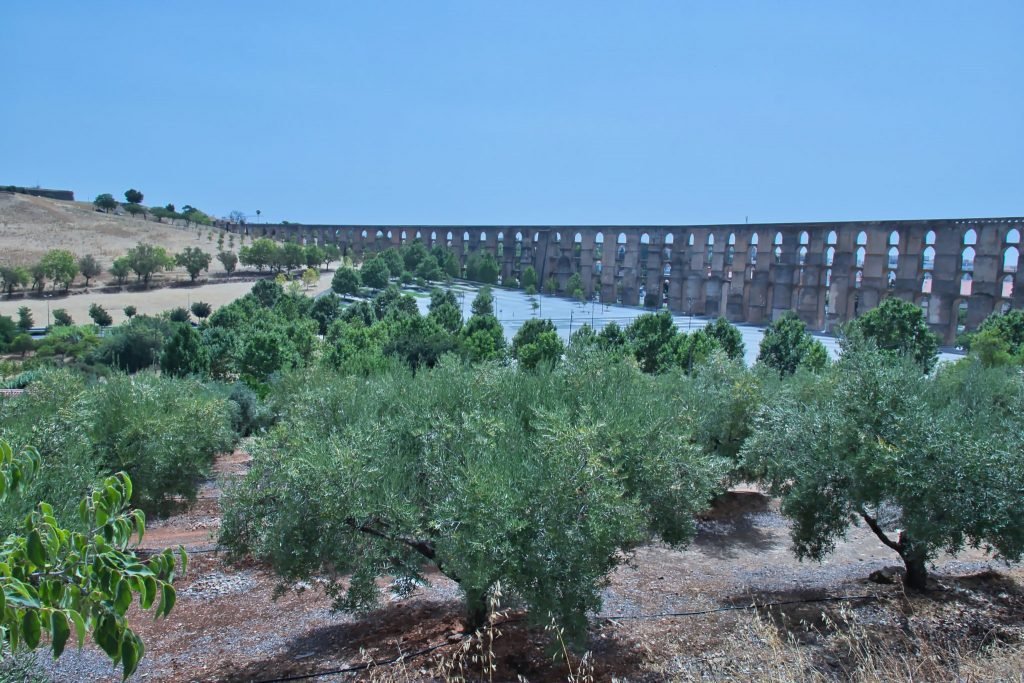Elvas is a Portuguese town located in the Alto Alentejo, near to the border with Spain. It was considered a world heritage site by UNESCO in 2012 due to its fortifications of the 17th and 18th centuries. Contributing to its classification were the Seventeenth-Century Walls of Elvas, the Amoreira Aqueduct, the Fort of Nossa Senhora da Graça and Santa Luzia, the Fortins of São Mamede, São Domingo and São Pedro, the Medieval Fences, military buildings and the Historic Center of the old stronghold of Elvas.
Its main heritage features are based on its military tradition, however, in Elvas’ history is breathed. In many streets
Being a city away from the big urban centres, life here is calmer. Elvas is the perfect place for a weekend retreat, allowing you to enjoy the fresh air of the countryside and the serenity of the Alentejo plain. As in all of Alentejo, Elvas is not far behind in gastronomy and is also a great place for those who like to enjoy the typical dishes of this area.
We love to make small trips in this area due to the proximity to Lisbon, the road accessibility, the friendliness of the locals, and the gastronomic tradition and wine production. The increase in the hotel offer in Alentejo is also an attractive factor for our getaways in the area since there are more and more interesting options to relax.
About Elvas
For exclusive travel tips, you can send us an email or a message on Instagram and also subscribe to our newsletter to receive everything directly in your inbox.
Top Attractions in Elvas
Fort of Nossa Senhora da Graça

The Fort of Nossa Senhora da
In a dominant position on Monte da Graça, it was part of the defence of Elvas Plaza and Elvas Frontier Town and its Fortifications.
Guided tours are possible inside.
Church of Nossa Senhora da Assunção
This church, located in the historic centre of the city, is part of Elvas Frontier Town and its Fortifications.
Castle of Elvas and Seventeenth-Century Walls

It is a work of Islamic fortification, rebuilt in the thirteenth and fourteenth centuries, took only in the 16th century its current aspect. It received the mayor of Elvas and was the scene of important events in the history of the country such as treaties of peace and exchanges of princesses.
Fort of Santa Luzia
The Fort of Santa Luzia is a small fortification with walls. Nowadays, this monument of military architecture houses the Military Museum, where an interesting collection of weapons, from the Middle Ages to the nineteenth century, as well as uniforms are displayed.
Amoreira Aqueduct

This aqueduct connects the site of Amoreira to the city of Elvas. It has 8.5 kilomet
The historical center of the old fort plaza of Elvas
Praised by the understood as the most powerful stronghold of Portugal it is considered unconquerable. It is a structure with a starry polygonal shape, and in battles, the defence was developing on twelve fronts. In its interior, the urban area is marked by military characteristics, where the barracks were housed for the troops, warehouses and parades.
Where to eat
For us
Portugal has a strong gastronomic tradition based on some historical facts, for example the way we use cod, dried and preserved in salt, is due mainly to the time of the discoveries, where it was not possible to have fresh food on board and this was an excellent choice to keep the fish for a long time.
As far as Alentejo gastronomy is concerned, it is heavily based on black pork and meat products, for example, sausages, in the use of bread as a base for some traditional dishes, such as açordas and
In Elvas, there are several options of traditional restaurants, where we highlight O Lagar or Tasquinha Alentejana.
Where to sleep
In Elva’s area, there are several accommodation options. There are both more traditional hotels as well as rural tourism units. Typically these units are a little removed from the centre and are usually in more rural areas or even within agricultural production properties.
Our choice on this trip was the Monte da Provença – Rural Hotel. It is a rural tourism unit with few rooms. The hotel is set on a farm that has an ecological policy in communion with nature. It has an outdoor space of relaxation that includes a swimming pool and several terraces, allowing to enjoy the sun and the excellent climate of that region. The room is comfortable and clean. Breakfast have essential products that are of good quality.
Planning your trip to Elvas?
- Find your travel insurance with Heymondo (get 5% off)
- Find your accommodation with Booking
- Find activities with GetYourGuide
- Find your eSIM with MobiMatter, use the code TWOBYTHEWORLD to get up to 50% cashback
- Find outdoor activities with Manawa
- Rent your car with Discovercars
- Book your flight with Skyscanner
If you are planning a trip, check our resources page.
Activities at Elvas
This post contains affiliate links that help support this project so we can create better content for you for free. By using our affiliate links, the resources we work with channel a small portion of the commission to support this project at no extra cost to you.
Legal disclaimer: All information on this blog is for informational purposes only. Readers should use the content with caution and verify its accuracy before making financial or travel decisions. This blog is not liable for any consequences arising from the use of the provided information.